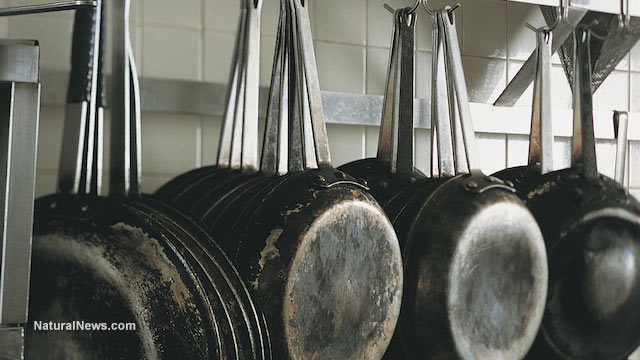'Considerable lead content' found in cookware commonly used throughout Africa and Asia
Monday, August 25, 2014 by: Julie Wilson
Tags: lead content, cookware, Africa

- Criminal referral requests filed against Fauci and top COVID officials in seven states
- Aluminum, essential to vaccine science, also causes serious health conditions, including chronic fatigue, neurodegenerative diseases, macrophagic myofasciitis
- DOGE unveils $400M unemployment fraud scandal: Toddlers, futuristic birthdates fuel outcry
- Gardening tips: 15 Simple tricks to double your garden’s yield this season
- Oats: A nutritional powerhouse for health and wellness
- TAKE IT DOWN Act advances in Congress amid free speech concerns
- Survival 101: Dangerous places to avoid when disaster strikes
- A turning point in American economic history: “The Origins of the Federal Reserve” by Murray N. Rothbard
- Nature’s arsenal: How plant compounds power military survival and healthcare in crisis
- Kawasaki unveils rideable ROBOT HORSE powered by hydrogen
- Amazon's Kuiper satellite launch delay highlights uphill battle against Musk's Starlink
- DOJ and ATF kill Biden’s “Zero Tolerance” firearms dealer policy
- U.S.-funded "anti-misinformation" groups persist, raising concerns over censorship and bias
- Tesla halts U.S.-made Model S and X orders in China amid escalating trade war
- Trump to impose major tariffs on foreign-made pharmaceuticals
- “Prepare Tribe: Prepare, Protect, Provide” on BrightU: How to build a disaster-proof shelter in the middle of nowhere
- “Prepare Tribe: Prepare, Protect, Provide” on BrightU: Protecting heirloom crops from corporate extinction
- Barley: A nutrient-dense ancient grain with modern benefits
- Tulsi Gabbard leads charge against the Biden regime’s global censorship of the 'Disinformation Dozen'
- Fauci is back in the limelight, and he’s busy promoting a future COVID or FLU pandemic
- Aerosolized bioweapons? Strange “diploid biomasses” falling out of the sky in Florida captured under the microscope
- Analysis: The coming economic collapse, a mass uprising and Trump's three secret weapons to halt the growing revolt
- Widespread social and economic unrest: Steve Quayle issues urgent financial warning of imminent asset collapse in new interview with Mike Adams
- Kiss Your Genetic Privacy Good-Bye! 23andMe Gets Green Light to Sell Your Intimate Genetic Details to Anyone They Want
- Tulsi Gabbard takes aim at censorship: Justice for the ‘Disinformation Dozen’
- Mike Adams releases country western hit single: Goin’ Back in Time is Comin’ Home
- U.S. lawmakers investigate Meta over alleged China collaboration
- CLOT SHOT PLANDEMIC UNFOLDING: Fibrous, rubbery clots caused by covid injections have prion-like seeding activity
- Chemtrails unveiled: How the CIA and Big Business are manipulating the weather for profit
- How Israeli military-connected corporations are secretly controlling your online privacy
- European Court of Justice: Healthcare professionals who promoted or administered COVID-19 vaccines are CRIMINALLY LIABLE for any harm caused
- DEATH by VACCINE or face PRISON time: Canadian Freedom Convoy leaders CONVICTED for protesting forced vaccination during the Covid Plandemic
- Defunding DEADLY mRNA jabs: Government funding for mRNA technology being scrutinized and sidelined until proven "safe and effective" for real
- Federal employees whine over DOGE's new directive requiring them to do a 5-point summary of weekly accomplishments
- U.S. approves new Russian ambassador as diplomatic thaw continues
- Curcumin’s ancient healing power supercharges muscle recovery, and its effects are compounded with anti-inflammatory foods and supplements
- Newly released JFK files reveal Pentagon's role in creating Lyme disease and covid in the same lab
- Analysis: The coming economic collapse, a mass uprising and Trump's three secret weapons to halt the growing revolt
- Mike Adams releases country western hit single: Goin’ Back in Time is Comin’ Home
- Aerosolized bioweapons? Strange “diploid biomasses” falling out of the sky in Florida captured under the microscope
- Kiss Your Genetic Privacy Good-Bye! 23andMe Gets Green Light to Sell Your Intimate Genetic Details to Anyone They Want
- Dr. Mike Yeadon releases 15-minute testimony - WATCH - about genocidal intent of COVID “vaccines”
- Trump reverses course on Gaza plan, says “nobody is expelling Palestinians”
- MEDICAL BOMBSHELL: FDA admits Covid mRNA 'Vaccines' CAUSE CANCER
- European Court of Justice: Healthcare professionals who promoted or administered COVID-19 vaccines are CRIMINALLY LIABLE for any harm caused
- The Health Ranger releases “Vaccine Zombie” song and music video, using AI-animated zombies for the music video
- 5 Simple steps to boost your brainpower: How to strengthen executive function in a distracted world
- A lack of integrity in Academia: Harvard professor found GUILTY of fraudulent research to promote CRT theory
- Federal employees whine over DOGE's new directive requiring them to do a 5-point summary of weekly accomplishments
- EPA advisor admits the agency is funneling billions to climate groups ahead of Trump’s return to White House
- California's social media censorship law struck down: A victory for free speech or a threat to online safety?
- Space war brewing? Russia threatens to destroy Starlink satellites
- Survival 101: Effective EMF blocking techniques
- Rep. Nancy Mace introduces bill to ban biological males from female facilities on federal property
- Red Cross issues warning to stop blood plasma donations from vaccinated people
- Scientists confirm: GENIUS brain function can be spontaneously unleashed in humans without any apparent cause
- EPA advisor admits the agency is funneling billions to climate groups ahead of Trump’s return to White House
- HYSSOP: What research reveals about the health benefits of this ancient holy herb
- Two containers with completed ballots fall out of truck in Florida
- Newly released JFK files reveal Pentagon's role in creating Lyme disease and covid in the same lab
- Global leaders unite to clamp down on “misinformation” with UN-backed Cascais Declaration
- BREAKING: 2025 NDAA authorizes mandatory military draft of WOMEN across America… as Pentagon pursues global NUCLEAR war with both Russia and China at the same time
- Michael Yon warns of a ZIONIST TAKEOVER in Trump’s second administration
- Ozempic and Wegovy weight loss drugs are injectable LIZARD VENOM PEPTIDES that may unleash a devastating wave of organ failure… side effects align with symptoms of SNAKE BITES
- The Health Ranger releases “Vaccine Zombie” song and music video, using AI-animated zombies for the music video
- Mike Adams releases country western hit single: Goin’ Back in Time is Comin’ Home
- BOMBSHELL: DNA testing kits are a SCAM to develop ethnic-specific bioweapons
- Israeli soldiers accused of even more torture and abuse in the West Bank
- These 13 countries just signed an agreement to engineer a global FAMINE by destroying food supply
- NASA admits that climate change occurs because of changes in Earth’s solar orbit, and NOT because of SUVs and fossil fuels
- Fully vaccinated about to see “tsunami” of illness and death, warns virologist
- RFK Jr. clears key hurdle: Sen. Susan Collins backs controversial HHS nominee, signaling a new era for health policy
Developing children are the most susceptible to lead poisoning, which can cause irreversible neurological damage that contributes to intellectual disabilities and lowered IQs.
Until recently, one of the main causes for lead poisoning was thought to be exposure to paint containing lead, which can be easily inhaled as a dust during home renovations. At least 30 countries have tried to phase out lead paint, but existing lead paint remains in high quantities all over the world.
Adult exposure can occur during industrial processes such as recycling and smelting, but environmental activities like mining have also contributed to thousands of deaths.
In 2010, Doctors Without Borders diagnosed and treated more than 1,000 children suffering from lead poisoning in a Nigerian village, some of whom were blind, parlayed and struggling at school from learning disabilities. The poisoning was caused by artisanal mining from a gold rush and killed at least 400 children. The exact number of deaths is still unknown, because the villagers tried to conceal the death count in fear that the government would put a halt to the lucrative mining, which paid 10 times more than farming.
New research conducted in Middle America has discovered a possible new culprit for lead poisoning, particularly throughout parts of Africa and China
Researchers from Ashland University, a mid-sized private university located a short distance from Akron, Cleveland, and Columbus, Ohio, tested African-made cookware and found "considerable lead content" in the majority of their samples.
Led by Dr. Jeff Weidenhamer, professor of chemistry at Ashland University, the research involved testing 29 samples of aluminum cookware made in Cameroon, a country in West Africa that borders the Bight of Bonny, which is part of the Gulf of Guinea and the Atlantic Ocean.
The study, "Lead Exposure from Aluminum Cookware in Cameroon," simulated cooking by boiling acidic solutions in the cookware for two hours, and then measured the amount of lead extracted from the solution. The solution contained almost 200 times more lead than California's Maximum Allowable Dose Level (MADL) of 0.5 micrograms per day.
"Unlike some other sources of lead contamination, lead poisoning from cookware can impact entire families over a life-time. Even low-level lead exposures can result in reduced IQ and neurological deficits, and contribute to cardiovascular disease," said Weidenhamer.
The cookware, which is commonly found throughout parts of Africa and Asia, is made from recycled scrap metal including auto and computer parts, cans, and other industrial debris
Although there is no current regulatory standard set for lead in cookware, the WHO and U.S. Centers for Disease Control and Prevention warn that no amount of lead exposure is safe.
"This previously unrecognized lead exposure source has the potential to be of much greater public health significance than lead paint or other well-known sources that are common around the world," said Perry Gottesfeld, executive director of Occupational Knowledge International in San Francisco.
Published in the August issue of the journal Science of the Total Environment, the study confirmed the discovery of significant levels of aluminum and cadmium that also leached from the cookware.
In regard to recent surveys revealing persistent lead exposure in Africa and Asia, Gottesfel added, "The presence of lead in food cooked in these pots may be one contributing factor to the ongoing lead poisoning epidemic."
Additional sources:
http://news.ashland.edu
http://www.sciencedirect.com
http://www.foxnews.com
http://allafrica.com
http://www.who.int
http://cameroon.thebeehive.org
http://science.naturalnews.com
Lead content at FETCH.news
Get independent news alerts on natural cures, food lab tests, cannabis medicine, science, robotics, drones, privacy and more.
Take Action: Support Natural News by linking to this article from your website
Permalink to this article:
Embed article link: (copy HTML code below):
Reprinting this article:
Non-commercial use OK, cite NaturalNews.com with clickable link.
Follow Natural News on Facebook, Twitter, Google Plus, and Pinterest
Science News & Studies
Medicine News and Information
Food News & Studies
Health News & Studies
Herbs News & Information
Pollution News & Studies
Cancer News & Studies
Climate News & Studies
Survival News & Information
Gear News & Information
News covering technology, stocks, hackers, and more



"Big Tech and mainstream media are constantly trying to silence the independent voices that dare to bring you the truth about toxic food ingredients, dangerous medications and the failed, fraudulent science of the profit-driven medical establishment.
Email is one of the best ways to make sure you stay informed, without the censorship of the tech giants (Google, Apple, Facebook, Twitter, YouTube, etc.). Stay informed and you'll even likely learn information that may help save your own life."
–The Health Ranger, Mike Adams













































